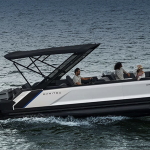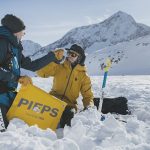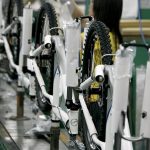Amer Group PLC saw third quarter net sales increase 6.2% to 301.1 million ($339.2 million) compared to 283.6 million ($279.0 million) in the year-ago period. Foreign exchange rate movements reduced net sales by 17 million ($19.2 million) during the quarter. Net profit jumped 48.8% to 38.6 million ($43.5 million)on a gain of $23.0 million, or 20.5 million, from a favorable U.S. patent litigation case involving Precor and Brunswick's Life Fitness unit. Excluding the settlement, Amer Group would have seen a 31.2% net profit decline to 18.1 million ($20.4 million).
Sales of racquet sports equipment started to pick up again during the third quarter. In the USA, public sector organizations started to invest in fitness equipment after a quieter first half of the year. In Winter Sports, the peak delivery season to the trade started in September and deliveries that month were similar to last year's levels. In the golf business, by the end of the period under review, the season was tailing off.
In line with plan, Amer Group has continued its re-organisation of Wilson, which started in the spring. Golf and Racquet Sports' sales functions in the USA were re-organised during the summer. In addition, the remaining owned assembly of golf clubs and golf bags will be outsourced at the beginning of 2004. Wilson's re-organisation and new cost structure are expected to lower Amer Group's overall cost base by approximately 12 million in 2004. In the guidance for the year as a whole, additional costs of approximately 4 million are included as a result.
JANUARY – SEPTEMBER NET SALES AND RESULTS
Amer Group's net sales for the YTD period through September inched up 0.1% to 836.8 million ($928.8 million)while net profit rose 2.1% to 52.9 million ($58.7 million), 2.27 ($2.52) per share. Amer Group's net sales for 2003 as a whole are expected to be similar to 2002's 1.1 billion), but operating profits are expected to decline 2.9% to 12.6% from last year's 103.0 million.
Foreign exchange rate movements reduced net sales by 83 million ($92 million) and had a slightly negative impact on operating profit. Operating profit includes a gain of $ 23.0 million, or 20.5 million from a favorable patent litigation case, which the Company recently settled in the U.S.
The sports equipment market continued to be challenging and demand for sports equipment did not recover significantly, but the acquisition of Precor at the end of 2002 increased net sales by 128.6 million ($142.7 million) and operating profit by 14.1 million ($15.7 million) after goodwill amortisation.
Geographically, sales were similar to 2002 in North America and in Europe but grew by 4% in Asia Pacific and declined by 12% in Japan. Sales in North America were boosted by the first time contribution of Precor.
Reviewing the Group's divisions, the Team Sports Division continued to perform well during the period. In the golf equipment market, competition continued to be tough and the Golf Division's sales were significantly down compared to last year. The Racquet Sports Division's sales were also lower than 2002's. Sales of Sports Instruments were reduced by a decline in demand for diving instruments as well as sales of non-core products. In Winter Sports, the delivery season started in September and deliveries that month were similar to last year's level. Amer Tobacco's sales declined as the Finnish cigarette market shrunk.
Return on capital employed (ROCE) was 17.7% (2002: 17.5%).
CAPITAL EXPENDITURE
The Group's gross capital expenditure amounted to 11.4 million (2002: 14.6 million) during the period under review.
RESEARCH AND DEVELOPMENT
A total of 21.5 million was invested in research and development, representing 2.6% of net sales in the period (2002: 16.4 million).
FINANCE
The Group's net financing expenses totalled 6.3 million (2002: 5.2 million).
The equity ratio increased to 49.3% from 45.6% as at the end of 2002 (54.8% as at 30 September 2002), while gearing decreased from 47% to 34% (15% as at 30 September 2002).
The Group's net debt decreased to 153.8 million at the period end, compared to 209.9 million as at 31 December 2002. Liquid assets amounted to 23.8 million at the period end.
PERSONNEL
The Group employed 4,128 people at the end of the period under review compared to 3,939 at the year-end and an average of 4,112 during the period. At the end of the period, a total of 1,546 were employed in the US, 706 in Austria, 660 in Finland and 1,216 in the rest of the world.
SHARES AND SHAREHOLDERS
A total of 58.7% of the Group's shares in issue were traded during the period under review, of which approximately 13.15 million were traded on the Helsinki Exchanges and approximately 0.53 million on the London Stock Exchange, totalling 13.68 million shares. In Helsinki the share price low was 26.03, the high 36.50 and the average 29.19. The Company's market capitalisation (excluding the shares owned by the Company) stood at 707.5 million at the period end.
There were 11,776 registered shareholders at the end of September, whilst nominees accounted for 48% of the shares in issue at the period end.
In June, Fidelity International Limited announced that it's holding in Amer's share capital and voting rights had fallen to 9.90%.
During the period under review, a total of 198,550 new shares were registered. The shares were subscribed for as a result of an exercise of 1998 A/B/C warrants. As a result of the corresponding increase in the Company's share capital, Amer Group Plc's share capital totalled 97,578,280 and the total number of shares in issue was 24,394,570 at the period end. In addition, the Company's share capital may increase further by 532,950 new shares as a result of the 1998 warrant subscription.
Amer Group Plc's Annual General Meeting approved on 20 March 2003 that the registered share capital of Amer Group be decreased by 3,873,200 by cancelling without payment those 968,300 of its own shares the Company holds. However, the registration notification regarding the decrease was delivered to the Trade Register after the appropriate time period of one month had passed. Thus, according to the Companies Act, the AGM resolution to decrease the Group's share capital lapsed. Because the shares to be cancelled are held by the Company, the failed registration has no impact whatsoever on the operations of the Group or on its financial status. Therefore, the Group's Board of Directors decided that the matter can be resolved at the 2004 AGM and no extraordinary meeting is necessary prior to then.
At the end of the period the Board of Directors had no share issue authorisations outstanding.
DIVISIONAL HIGHLIGHTS
RACQUET SPORTS
| million | Jan-Sept 2003 | Jan-Sept 2002 | Change % |
| Net sales | 173.1 | 204.6 | -15 |
| Operating profit | 18.5 | 22.4 | -17 |
| ROCE, 12 months' rolling average, % | 48.8 | 51.7 |
In local currencies, the Racquet Sports Division's net sales declined 3% and operating profit also declined 3% in January – September. In both Europe and in Japan, sales were similar to 2002. Sales declined 6% in North America. During the third quarter of the year, sales picked up in all major markets and, in local currencies, sales in July – September grew by 4% compared to the same period last year.
The Company estimates that the global tennis market continued to decline during the period under review. The average tennis racquet selling price also continued to fall.
Sales of Wilson tennis racquets decreased 4%, tennis balls 4% and footwear 5%. Wilson's position as the global market leader in tennis racquets remained strong and in tennis balls Wilson remains number three.
During the period under review, shipments of Wilson's new Triad racquets as well as its new Pro Staff racquets started. Shipments of the new Hammer racquet model, Series H, commenced in May and the sales to date have been good in all markets. New footwear was also introduced during the period under review.
In August, Wilson renewed its agreement with the United States Tennis Association to provide the Official Ball of the U.S. Open through 2009.
GOLF
| million | Jan-Sept 2003 | Jan-Sept 2002 | Change % |
| Net sales | 135.9 | 184.8 | -26 |
| Operating profit | -3.3 | 10.7 | – |
| ROCE, 12 months' rolling average, % | -12.4 | 6.3 |
In the Golf Division, net sales and operating profit were significantly below expectations in January – September. Net sales in local currencies declined 16%. Sales fell by 24% in North America, by 3% in Europe and by 4% in Japan. Operating profit also declined due to lower prices, especially for golf balls.
In the US market, overall sales of golf clubs to the trade grew slightly in January – September. The US golf ball market declined but sales did start to grow again during the summer (source: National Golf Foundation, October 2003). The number of rounds played declined in the USA. In Europe the market remained flat whilst the Japanese market continued to be challenging.
Sales of Wilson golf clubs decreased 14%. The golf ball market continued to be extremely competitive and Wilson golf ball sales declined 24% as a result.
The re-organisation of Wilson started in the spring, together with related adjustments to Wilson's cost base in line with its business and current market situation. This is expected to lower Amer Group's overall cost base by approximately 12 million in 2004 with most of the savings coming from the Golf Division. As part of the re-organisation, golf club assembly in Tullahoma, USA, and golf bag assembly in Springfield, USA, will be outsourced. The actions will result in additional costs of approximately 4 million being incurred by the Golf Division in 2003.
TEAM SPORTS
| million | Jan-Sept 2003 | Jan-Sept 2002 | Change % |
| Net sales | 143.2 | 162.0 | -12 |
| Operating profit | 17.5 | 20.8 | -16 |
| ROCE, 12 months' rolling average, % | 34.1 | 40.4 |
In local currencies, the Team Sports Division's net sales grew by 5%. Operating profit was similar to 2002's. Sales outside the US grew by 3%.
The fastest growing product categories in Team Sports were baseball and softball bats (18%) and basketballs (11%). Bat sales grew in both the US and Japan due to product line extensions into the youth baseball market and shipments of bats designed specifically for the Japanese markets.
The basketball sales growth is being driven by the new five-year National Collegiate Athletic Association (NCAA) ball adoption, which took effect at the beginning of 2003. As a result of this agreement, Wilson's basketballs are used as official match balls in all NCAA tournament games. In addition, Wilson has entered into an agreement with Major League Soccer (MLS) in the U.S. to be its official retail soccer ball.
Wilson is the number one team sports company in the USA and its position is especially strong in American football, basketball and baseball.
WINTER SPORTS
| million | Jan-Sept 2003 | Jan-Sept 2002 | Change % |
| Net sales | 116.5 | 136.2 | -14 |
| Operating profit | 12.3 | 23.0 | -47 |
| ROCE, 12 months' rolling average, % | 35.1 | 46.1 |
Net sales in local currencies declined 11% with reductions in all major markets during the first 9 months of the year. Sales of alpine skis declined 8%. However, Atomic retained its position as the No. 1 alpine ski brand in Europe.
Poor snow conditions at the beginning of the winter sports season 2002/2003 in Austria and Germany resulted in lower re-orders at the beginning of the current financial year.
The level of pre-orders for the 2003/2004 season was in volume terms close to last year's level. Lower price point products increased as a proportion of total sales. Deliveries are weighted towards the last quarter of the year to a greater extent than usual. The busiest period for deliveries started in September, continuing to the end of October. Deliveries in September were similar to 2002 levels.
With effect from the 2004/2005 season, the distribution of Atomic's products in Japan will be made through Amer Sports' local organisation. Distribution is currently undertaken by ASICS Japan.
The Company is expecting that there will be a slight downturn in the market in the 2003/2004 season. Sales during the remainder of the current year depend on snow conditions, their influence on sell-through and thus on supplementary orders from the trade. For the year as a whole, Atomic's net sales are expected to decline slightly compared to 2002. Profitability is expected to continue to be good.
FITNESS EQUIPMENT
| million | Jan-Sept 2003 | Jan-Sept 2002 (pro forma) | Change % |
| Net sales | 128.6 | 147.0 | -13 |
| Operating profit | 19.3 | 18.6 | 4 |
Fitness Equipment's net sales in local currencies were similar to last year's level. Operating profit grew by 24%. Sales of treadmills and cycles grew, whereas sales of elliptical cross-trainers declined slightly.
In North America, major club organisations are holding off on purchases, and consumers are similarly cautious. Public Sector organisations in the USA started to invest in fitness equipment again, which resulted in increased sales in the third quarter of the year following a quieter first half.
During the period, a new line of upright and recumbent cycles for club and commercial markets were brought to market. The new cycles pushed sales ahead in July-September.
Despite general uncertainty, the fitness sector as a whole is expected to continue growing. Further growth is also anticipated in the popularity of elliptical fitness equipment. The Fitness Equipment Division continues to have good growth opportunities especially outside North America.
SPORTS INSTRUMENTS
| million | Jan-Sept 2003 | Jan-Sept 2002 | Change % |
| Net sales | 55.9 | 61.8 | -10 |
| Operating profit | 5.9 | 6.8 | -13 |
| ROCE, 12 months' rolling average, % | 33.2 | 29.7 |
In local currencies, Suunto's net sales declined 5%. Operating profit declined 12%.
Sales of Suunto's wristop computers grew 6%. The global diving market declined and sales of Suunto's diving instruments fell by 12%. In contrast to market developments generally, sales of Suunto's diving instruments picked up in the third quarter. Wristop computers and diving instruments accounted for 61% of Suunto's net sales.
Suunto's sales in North America were similar to 2002 but declined in Europe by 9%. In Europe, sales were affected by the general decline in demand for diving instruments and also by the withdrawal of intermediate business from the product range.
In January, Suunto announced a partnership with Microsoft. This cooperation will lead to a new Suunto n3 sports wristop being launched in North America at the beginning of 2004.
In October, Suunto brought its new Suunto X3HR wristop computer, which features a heart rate monitor, to the market.
In March Suunto sold its wholly-owned subsidiary Ilotulitus Oy to Truebell Plc. The net sales of Ilotulitus Oy in 2002 were 2.8 million.
TOBACCO
| million | Jan-Sept 2003 | Jan-Sept 2002 | Change % |
| Net sales | 83.6 | 86.4 | -3 |
| Operating profit | 7.5 | 7.3 | 3 |
Reflecting the decline in the Finnish tobacco product market, Amer Tobacco's net sales decreased by 3% to 83.6 million (2002: 86.4 million). Also, the growing popularity of lower-priced brands had a negative influence on Amer Tobacco's net sales. Operating profit was 7.5 million (2002: 7.3 million), benefiting from lower raw material costs.
Overall tobacco product deliveries to outlets in Finland declined by 2% in the period, mainly due to increased grey market activity.
Amer Tobacco's sales outside Finland increased. In addition to the increase in sales volumes of its own brands in Estonia, tax-free deliveries of Marlboro products to neighbouring markets contributed to the improvement.
WILSON RE-ORGANISATION EXPECTED TO RESULT IN COST SAVINGS IN 2004
The re-organisation of Wilson's US businesses which started in April has continued in line with plan. Golf and Racquet Sports' US sales functions have been combined, whilst Wilson's central administration functions have been discontinued and decentralised.
As a part of the re-organisation, the assembly of golf clubs will be outsourced. Golf club assembly and the warehouse activity in Tullahoma, USA will thus be discontinued at the beginning of 2004. The warehouse functions will be shifted to Wilson's central warehouse in Nashville. Golf bag assembly in Springfield, USA, is also being discontinued and outsourced. Approximately 70 positions will be affected. These actions will result in additional costs of approximately 4 million in 2003 being incurred by the Golf Division.
The re-organisation, together with related adjustments in Wilson's cost base in line with its business and current market situation, is expected to lower Amer Group's overall cost base by approximately 12 million in 2004.
AMER GROUP GAINS 23 MILLION USD FROM PATENT LITIGATION SETTLEMENT
Operating profit for the January – September 2003 period includes a gain of 23 million USD following the amicable settlement of a patent litigation case in the USA. The other party to the litigation, the Life Fitness division of Brunswick Corporation, will pay the settlement amount in two annual installments in 2003 and 2004, in return for a sublicense of the patent rights held by Precor, a part of Amer Group, to use technology for elliptical fitness equipment. In addition, Precor will receive royalties on future sales of products by Life Fitness that are covered by the patent.
DEVELOPMENTS SINCE THE END OF THE THIRD INTERIM PERIOD
In October, Fidelity International Limited announced that it's holding in Amer's share capital and voting rights had fallen to 4.97%.
2003 PROSPECTS
The world economy has shown some signs of recovery, however there is still uncertainty about its sustainability. Demand for sports equipment has stabilised, but is not expected to increase during the remaining few weeks of the current financial year.
Amer Group's net sales for 2003 as a whole are expected to be similar to 2002's (2002: 1,101.9 million), whereas operating profit is expected to be around 90-100 million (2002: 103.0 million). The Group's cashflow and balance sheet are expected to remain strong.













